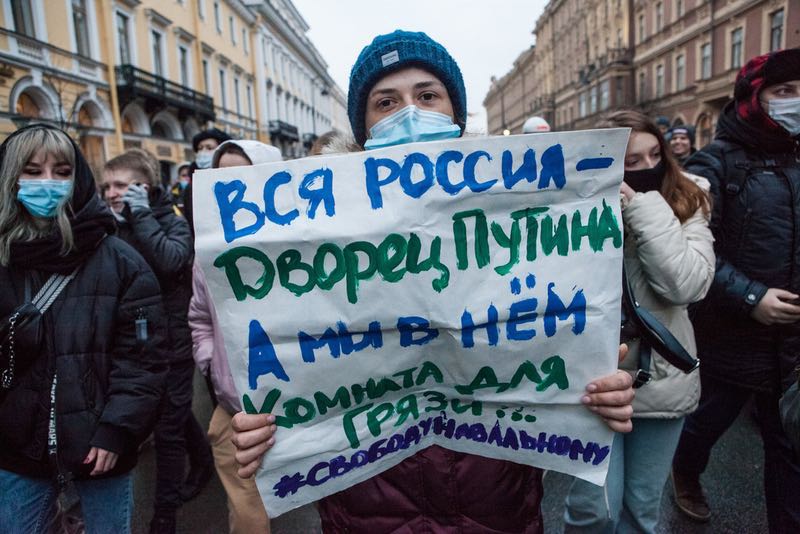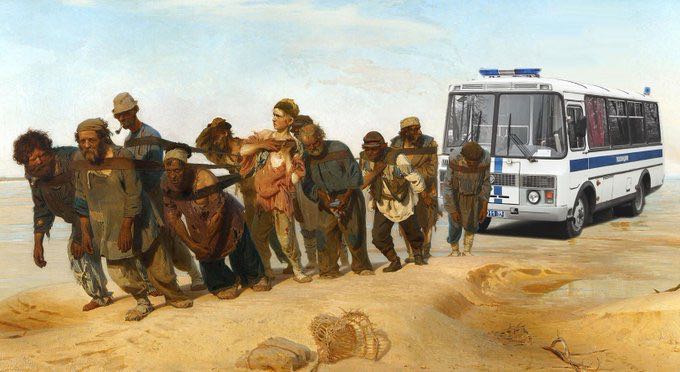Alexei Navalny is a 'classic hero', who seeks and finds the meaning of life. In fairy tales and mythology there are lots of examples of this specimen, that goes through ordeals to attain its goal. From Odysseus to Frau Holle, the scheme is identical. However, the often made comparison between Navalny and another emigré who returned to Russia, Vladimir Ilyich Lenin, is false, argues ex-provo Roel van Duijn, who had his own experience with Dutch secret services.
by Roel van Duijn
Alexei Navalny is a classic hero, who seeks and finds the meaning of life. For more than twelve years he has been fighting a struggle of life and death with the government of Russia and he's been shooting his arrows into the bullseye. This bullseye is the nastiest disease in the country: the infectious corruption. Time and again Navalny was imprisoned at demonstrations and under various pretexts. His face was pelted with a caustic liquid, turning it green and almost blinding one eye. At his last trial, for so-called theft of money at the French cosmetics company Yves Rocher, faked charge, he was conditionally sentenced to three and a half years in prison.
Because what is he accused of? He survived an attack with a nerve agent because he was allowed to go to the doctor in the nick of time, boldly enough abroad.
What made him definitely a hero is that he found the courage to fly back to Moscow. Knowing what to expect. That is unique.
Unlike Lenin
Are there more examples in Russian history of such a heroic return to the motherland?
There are plenty of exiles in their history. Alexander Litvinenko, the former spy who fled to London, was murdered by his former colleagues. Mikhail Khodorkovsky, owner of the oil company Yukos who did not want to join the oligarchic circle around president Putin and financially supported the opposition, disappeared in a prison near the Chinese border for years, and was forced to move to Switzerland after his release in 2013. But he lacks the extraordinary courage of Navalny to return.
 Navalny inspired protests all over Russia
Navalny inspired protests all over Russia
Alexander Solzhenitsyn, writer and Gulag inmate, did return. He was expelled from the Soviet Union in 1974 because in his books, One Day in the Life of Ivan Denisovich and The Gulag Archipelago, he had masterfully exposed the derelict system in the camps. He returned in 1994 after the deminse of communism, distinguished with the Nobel Prize, but in the Yeltsin-years he was able to live a life full of esteem until his death. What made him a hero were his books, but not his return. It was warm and risk-free.
There was another, who was not welcome and yet returned. That was Vladimir Ilyich Lenin, like Navalny, a lawyer by profession. As communist leader in 1907, he had fled Tsarist police violence and settled in Switzerland - as Khodorkovsky did later. Lenin was a Marxist theorist and teacher, and when he returned in April 1917, he managed to transform Russia into another country within a year.
All over former Russia, which he rebaptised into the Soviet Union, statues of him were erected and paintings made. He became an official hero, but there is a big difference between his return and Navalny's. Like Navalny, while returning he had the support of Germany, but in Lenin's case this had nothing to do with respect for human rights. Support for Lenin was part of the German warfare in 1917. At that late stage in the World War, the country was painfully trapped between the Western and Eastern fronts. To attack France anew with force, the Emperor and his generals devised a ruse to eliminate Russia. They sent Lenin, with about twenty comrades who wanted Russia to stop fighting, on a sealed train to St. Petersburg. He received about 70 million euro's for propaganda for the cessation of warfare and the overthrow of Kerensky's provisional government.
 Last private minutes with his wife Julia in the plane back to Moscow
Last private minutes with his wife Julia in the plane back to Moscow
In my view, Lenin, supported by dictatorial Germany, was not a hero but a pawn in the game of the belligerent enemy. A true hero relies solely on his own strength and bravery. And that's what’s special about Navalny's unprotected return.
Fortunately for Lenin, no one knew about the German money. Unfortunately for Navalny, many Russians believe Putin's lies that he is a Western spy and that the attack on him was nothing but a stunt by Navalny himself. But a true hero keeps going. And there are Russians who acknowledge that and are moved. Before Navalny's return Russia experts wrote about the general apathy in the country, but his audacious return turned the dullness into rebellion.
The magic of a return
What is the magic of a hero's return?
American mythologist Joseph Campbell (1904 - 1987) delved into hundreds of myths and classic folktales. According to him, all of these stories develop around the hero's return. Time and again, he says, the protagonist is forced to leave his safe environment by an inner calling or a stroke of fate. To endure a trial by fire in an unknown land and to return triumphantly. You come across this even in simple fairytales like Frau Holle. The poor girl leaves home, fulfills the tasks that Mrs. Holle assigns her, walks through the gate under a shower of gold and returns home rich. Departure, initiation, fulfillment of the task, and return. That's the basic scheme.
The same accounts for blogger Navalny.
 On the internet circulates this meme of Russians pulling their own police van, based on the famous painting The Wolga boatsmen by Ilya Repin
On the internet circulates this meme of Russians pulling their own police van, based on the famous painting The Wolga boatsmen by Ilya Repin
His departure from Russia must have initially been a mystery to him. Screaming in pain on a plane, a hospital here, a hospital there. In a coma, he does not even know that he is in Berlin, after all, his departure was unintentional. This fits with the basic scheme of the hero story: fate likes to have a say when a hero leaves. His job is to recover from Novichok poisoning; indeed, this gives the hero a super strong feat and moreover he unmasks one of the perpetrators of the attack.
On his return, he is caught, immediately brought before the court, and is convicted, but a few days later he hears about the massive demonstrations across the country. Now in prison, the demonstrations will sooner or later continue. Navalny’s return gloriously fits the mythological scheme and thus has struck a chord in the human soul.
And there is one more thing that truly fits this 44-year-old man from Moscow. In the mythological scheme, the hero returns home with a treasure. In Navalny's case, it is the film about the secret palace of Putin’s, the enemy to be defeated. The film is a treasure as it has been clicked uncountable times and has motivated many anti-Putin protesters to take to the streets, despite police, despite punishment.
Does that also mean he will win? That we are entering a year in which not only Trump but also his dictatorial friend Putin must leave the scene, as the corrupt fraudster that he is?
Vladimir Putin arrests, punishes, tortures, and can pay his police, for now. He does not have to be afraid of elections because he arranges the results with one nod to the chairman of the electoral committee. Navalny is not allowed to participate while Putin is in power. Putin can even prevent Navalny’s wife Yulia or his lawyer Lyubov Sobol from running. And the media, primarily television, are under his command. How can the imprisoned Navalny ever break his power?
Lenin returned in April 1917, and in July a workers' revolt flared up in Petersburg and was crushed. Lenin had to flee again, now to Finland. An apparent defeat, but a few months later he returned once more and now the official but false hero Lenin triumphed.
The course of Lenin's return shows that the real hero Navalny does not have to be immediately successful in order to be at the head of another Russia in the long run. The owner of the secret palace will do everything he can to get in Navalny's way. He would rather not give a new order to his secret service to kill him with nerve gas, that is becoming apparent. But he will have the man he calls ‘Nobody’ perform forced labor or freeze on an Arctic island. Is Nobody then eliminated?
Remember Odysseus
The fact that Putin gave him that name can make him look ugly. When the hero Odysseus was imprisoned by the Cyclops in his cave, he said his name was Nobody. One night, Odysseus got the Cyclops drunk, and he and his crew put out the one eye of the monster with a burning log. The hero could then cunningly escape the blinded giant. Crying for help to his fellow cyclops had no effect, for when they asked who had blinded him, he roared: ‘Nobody!’ Odysseus now returned safely to his wife in Greece and had the strength to massacre all the occupiers of his house.
 Navalny immediately after waking up out of his coma in the Berlin Charité Hospital
Navalny immediately after waking up out of his coma in the Berlin Charité Hospital
The consummate hero Navalny has gone through fire. He has given himself a halo of invulnerability and he certainly has a chance. Success does not necessarily mean that he will conquer power himself. The Jewish hero Moses died before he could enter the Promised Land. Martin Luther King, Jr. pointed out the night before his death that he probably would not be with his people much longer. The success of a hero is that he brings a new spirit and through that his aspirations on the long run acquire the strength of a hurricane.
This is what universal hero stories, from Frau Holle to The Odyssey, teach us about the future of Alexei Navalny in Russia.
About the author
Roel van Duijn (1943) is a Dutch activist and politician. In the seventies he was city councilor and alderman in Amsterdam. In 2009 he got evidence that for years he was was shadowed by Dutch intelligence.
Translated by Pamela Docters. Originally published by the Dutch daily newspaper Trouw.
